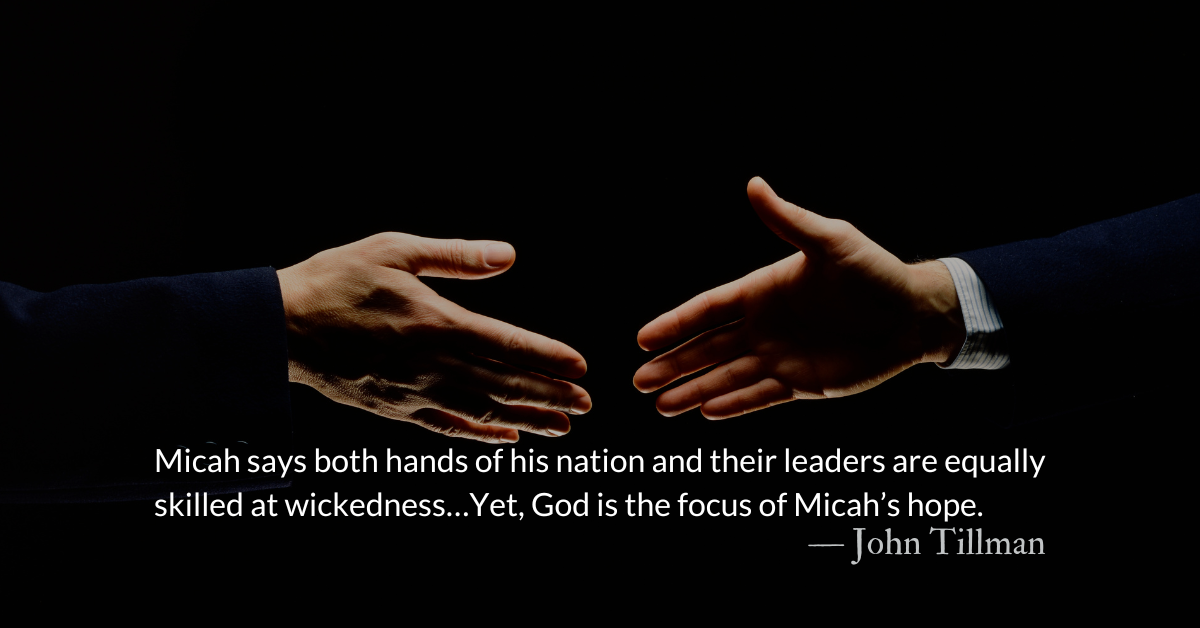Scripture Focus: Micah 7.3-4, 18-20
3 Both hands are skilled in doing evil;
the ruler demands gifts,
the judge accepts bribes,
the powerful dictate what they desire—
they all conspire together.
4 The best of them is like a brier,
the most upright worse than a thorn hedge.
18 Who is a God like you,
who pardons sin and forgives the transgression
of the remnant of his inheritance?
You do not stay angry forever
but delight to show mercy.
19 You will again have compassion on us;
you will tread our sins underfoot
and hurl all our iniquities into the depths of the sea.
20 You will be faithful to Jacob,
and show love to Abraham,
as you pledged on oath to our ancestors
in days long ago.
Reflection: Equally Skilled Hands
By John Tillman
Micah’s concluding trio of poetic sections are tinged with lament because disaster and destruction are coming, but they all have a taste of hope. Micah sees beyond the deserved punishment in the present to the undeserved restoration in the future. The section that is heaviest with lament is the first.
In most individuals, one hand is more skilled than the other. Scripture notes several times the left-handed and ambidextrous skills of Benjamite warriors. (Judges 3.15, 20.16; 1 Chronicles 12.1-2) Micah says both hands of his nation and their leaders are equally skilled at wickedness. The righteous have been swept away—like harvested fields, where only bare vines remain. The country sprouts with rulers, judges, and the wealthy and powerful, who are like briers or thorns. There is no grain, grapes, or figs, only grift, bribery, conspiracy, and betrayal. Yet, God is the focus of Micah’s hope.
The second section is a confession with confidence in restoration, spoken in the voice of Israel. “I have fallen,” Israel says, “but I will rise” because “the Lord will be my light.” There is darkness now, but light is coming. Micah warns Israel’s enemies not to gloat because one day, the Lord will remove Israel’s shame, and her enemies will face their own downfall.
The concluding psalm overflows with praise, fueled by God’s faithfulness. Based on God’s nature, not their worthiness, God’s flock will be cared for, guided, and blessed. The good shepherd will defend his flock and put an end to evil, crushing sin like a snake underfoot. Wickedness will drown in the depths and righteousness rise to the heights.
Micah looked around his world, nation, and city and saw chaos, corruption, and coming catastrophe. So might we. We may see left and right hands equally skilled in wickedness in our world, nations, and cities. Powerful rulers, judges, and leaders dictate what they desire, take bribes, and demand loyalty. Our neighbors, communities, and even family members may treat us like enemies.
Let us hope not in the left or right hands of leaders but in the nail-pierced hands of Christ. Jesus is the snake-crushing, lost sheep-seeking, wounded sheep-healing, banquet before our enemies-providing shepherd of our souls. (Psalm 23) His skilled hands hold healing, hope, justice, and peace. Let us take his hand and follow him, extending our other hand to the world. The only source of hope is in his hands.
Music: Jon Foreman – “Equally Skilled“
Divine Hours Prayer: The Refrain for the Morning Lessons
I will bear witness that the Lord is righteous; I will praise the Name of the lord Most High. — Psalm 7.18
– From The Divine Hours: Prayers for Summertime by Phyllis Tickle.
Today’s Readings
Micah 7 (Listen 3:36)
Psalm 88 (Listen 1:58)
Apply or tell a student!
Currently accepting applications for #StudentWritersMonth!
Get #FreeCoaching and seminars by special guests. Get published and a scholarship/stipend.
Read more about Supporting Our Work
Please consider becoming a donor. Support ad-free content that brings biblical devotionals to inboxes across the world.








